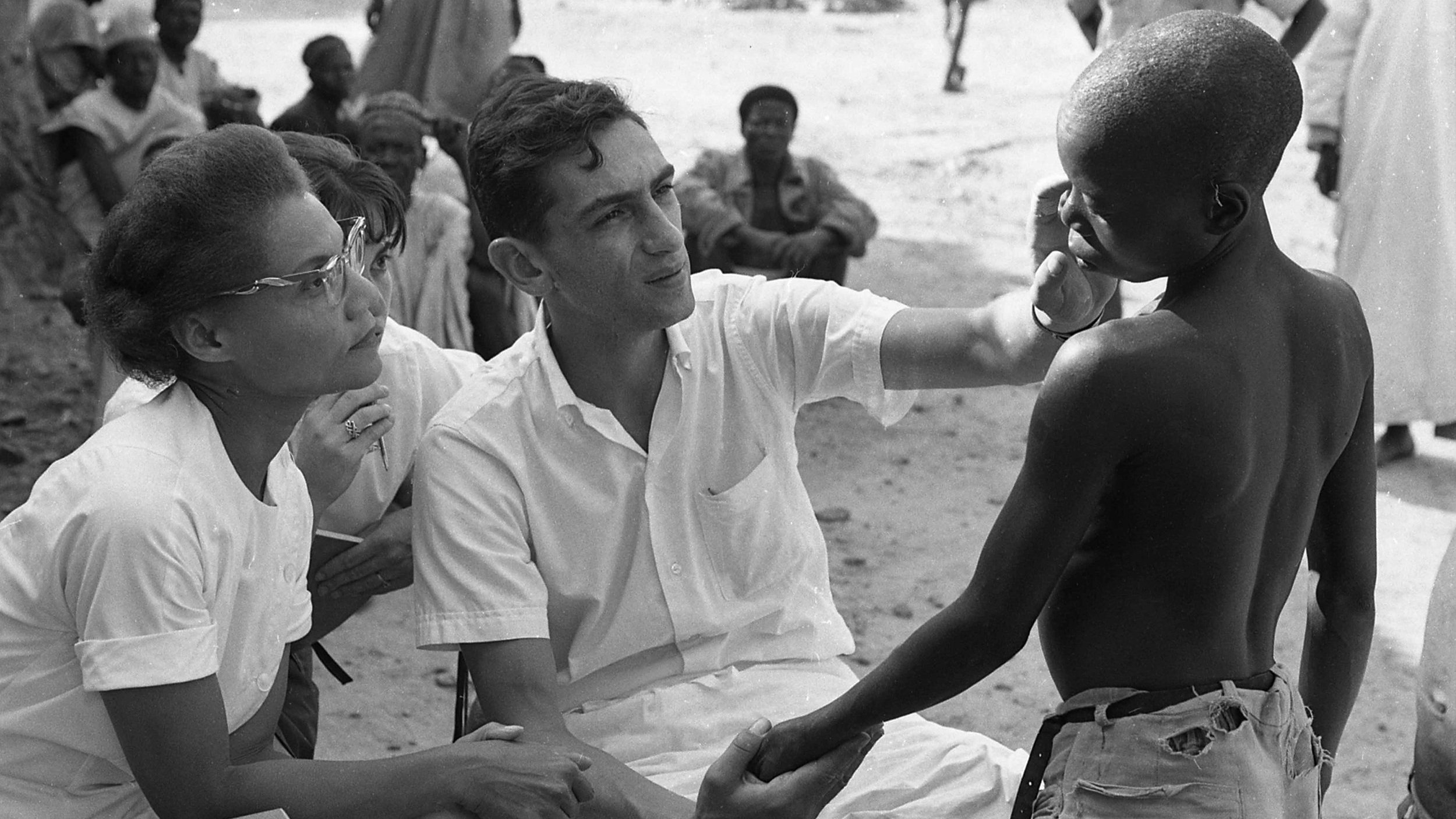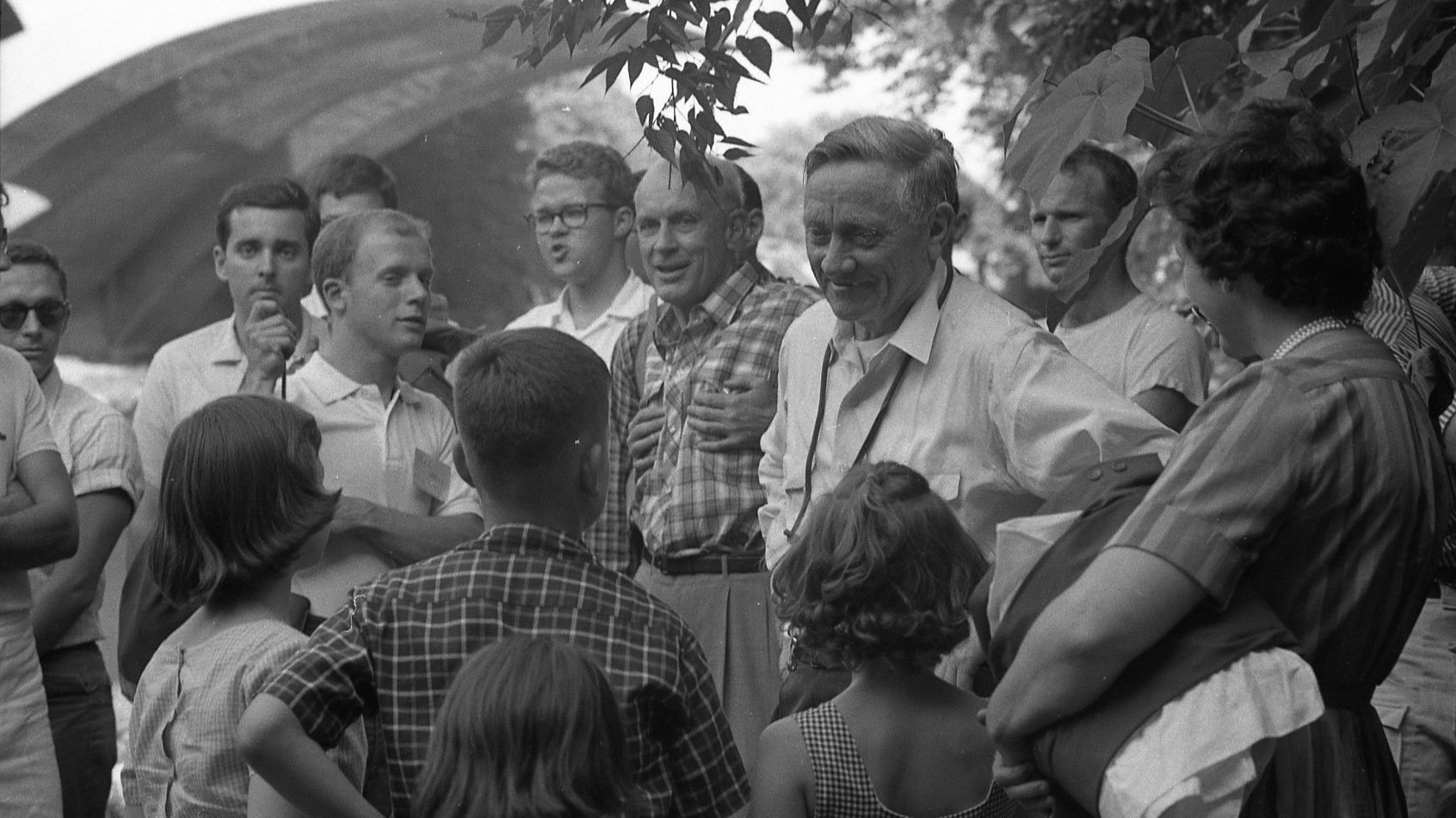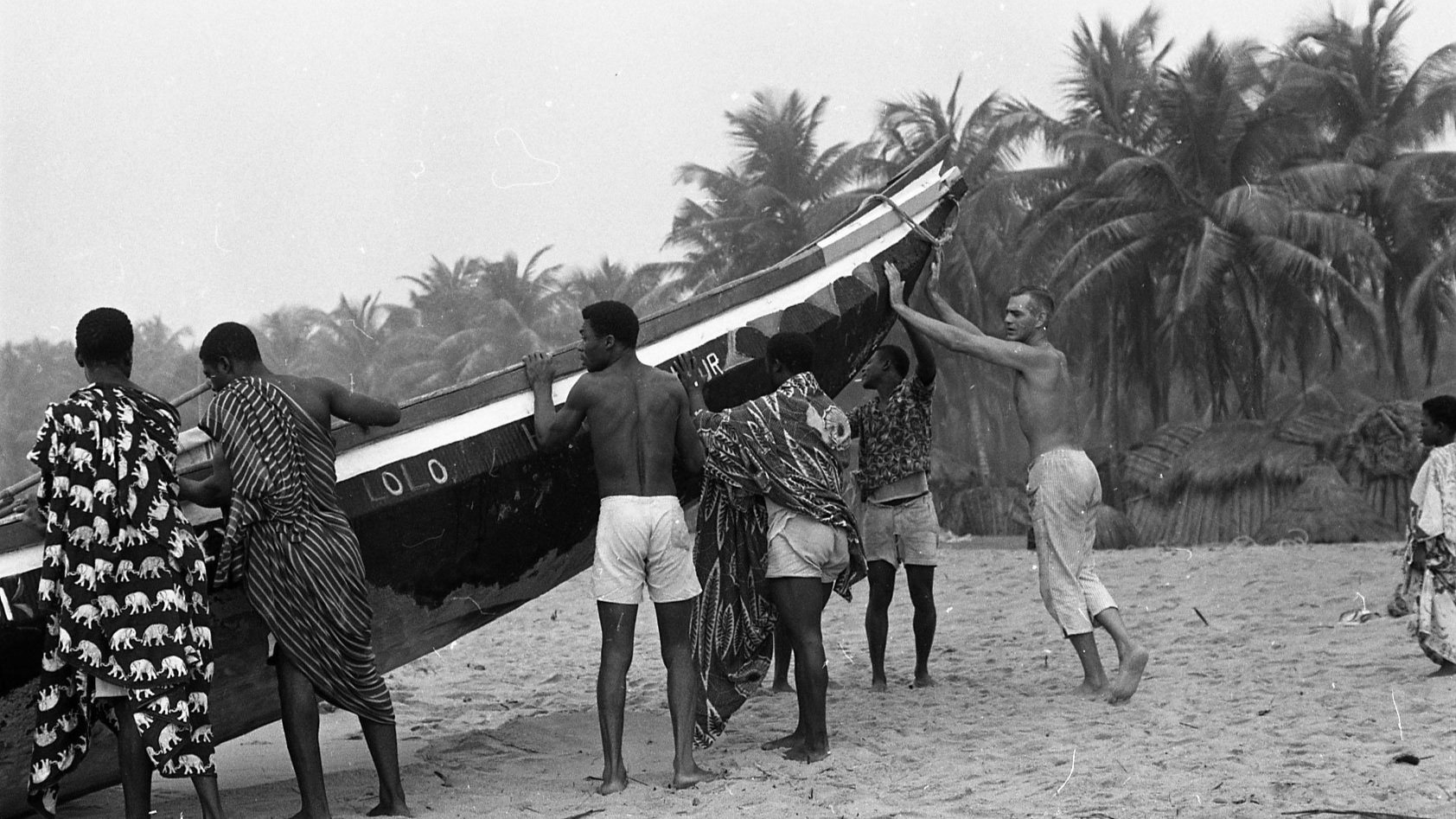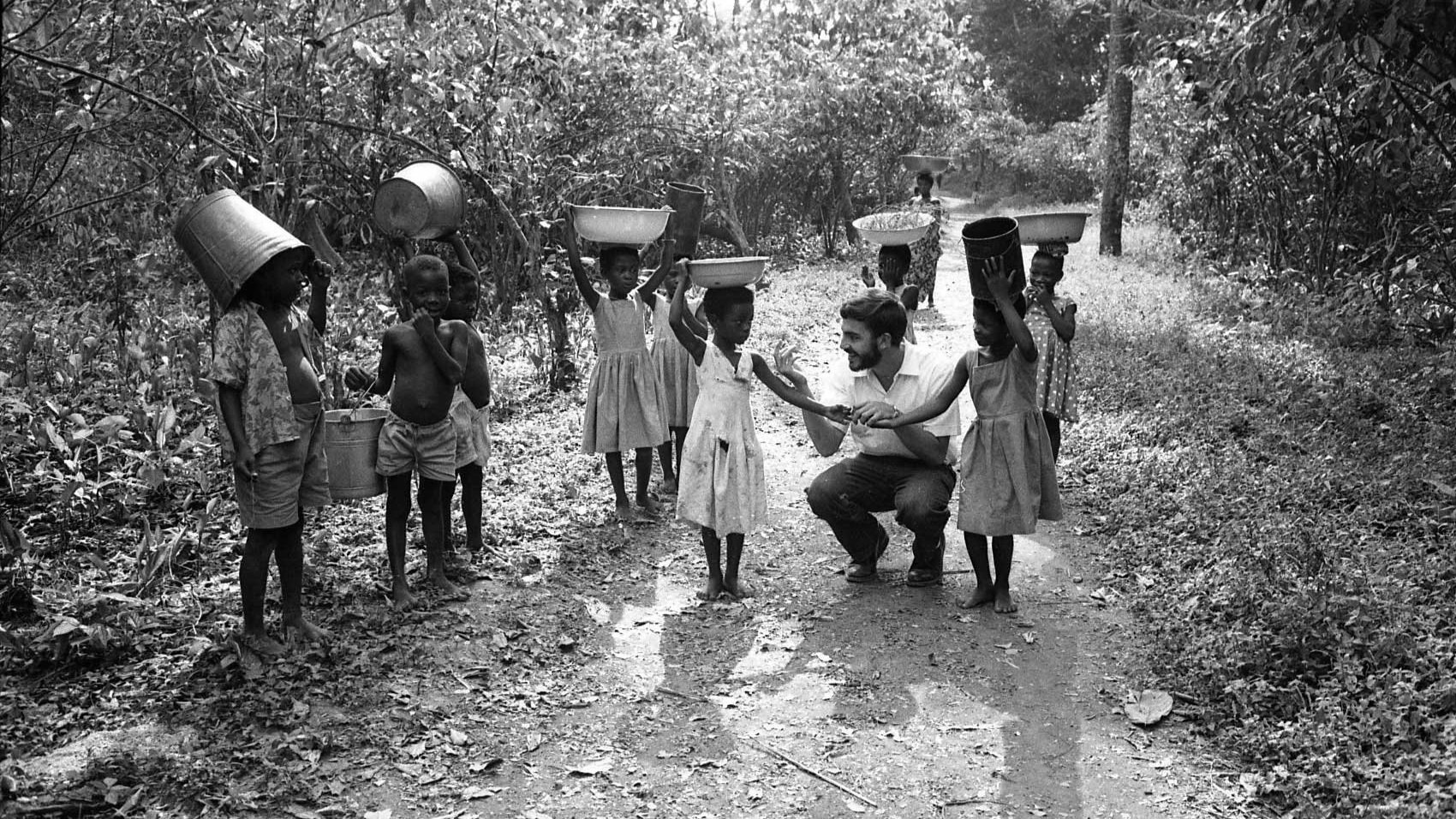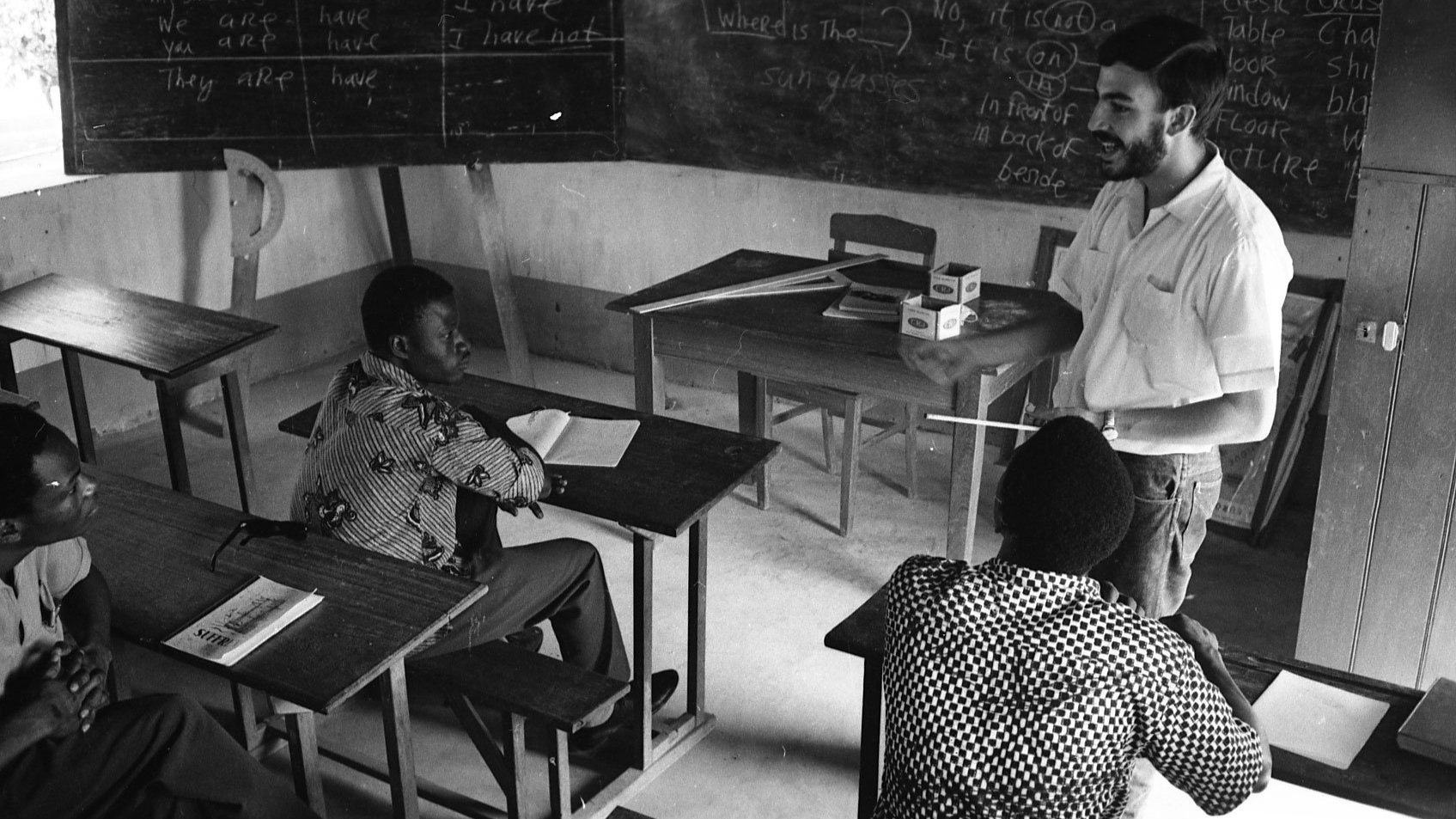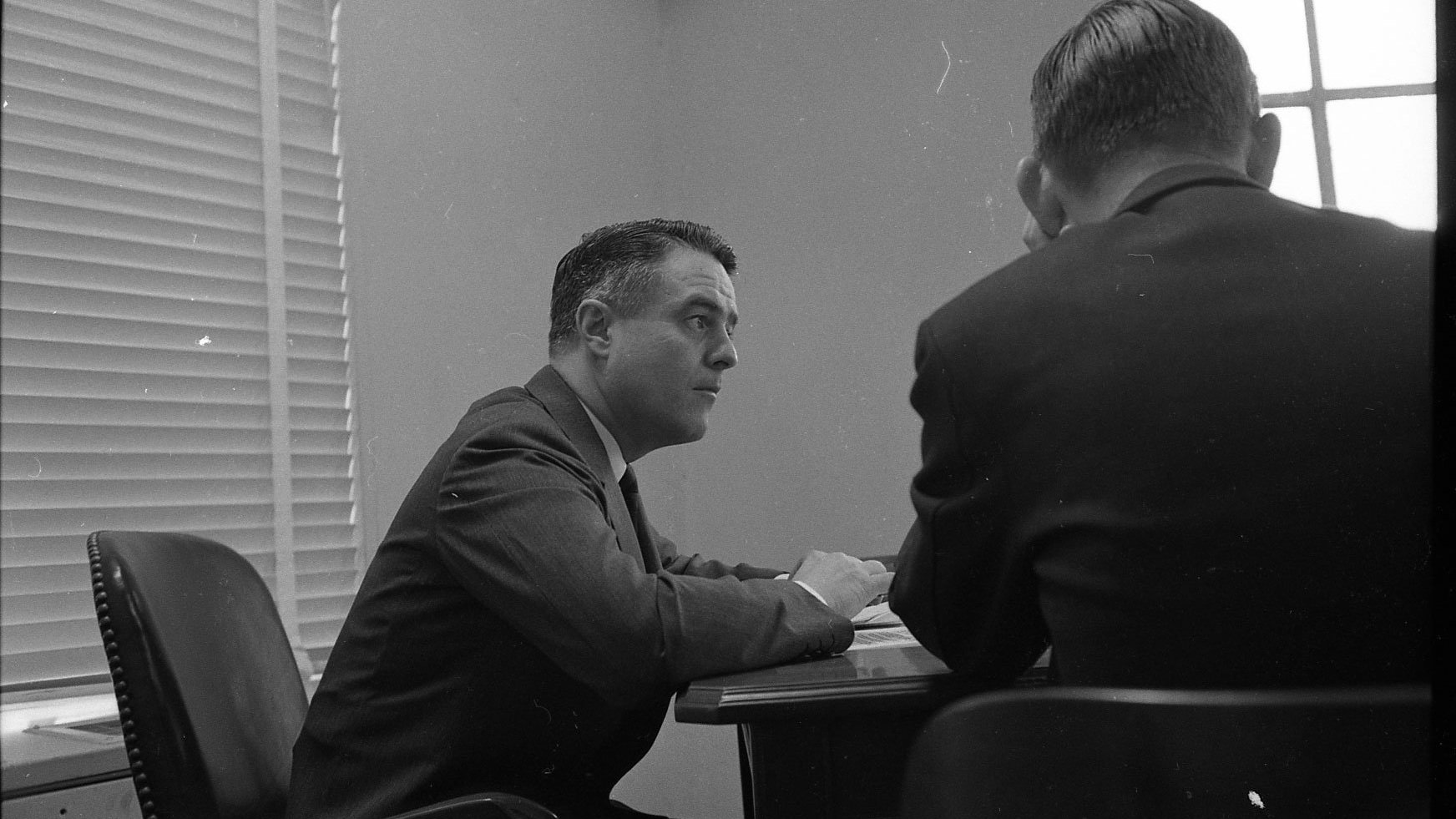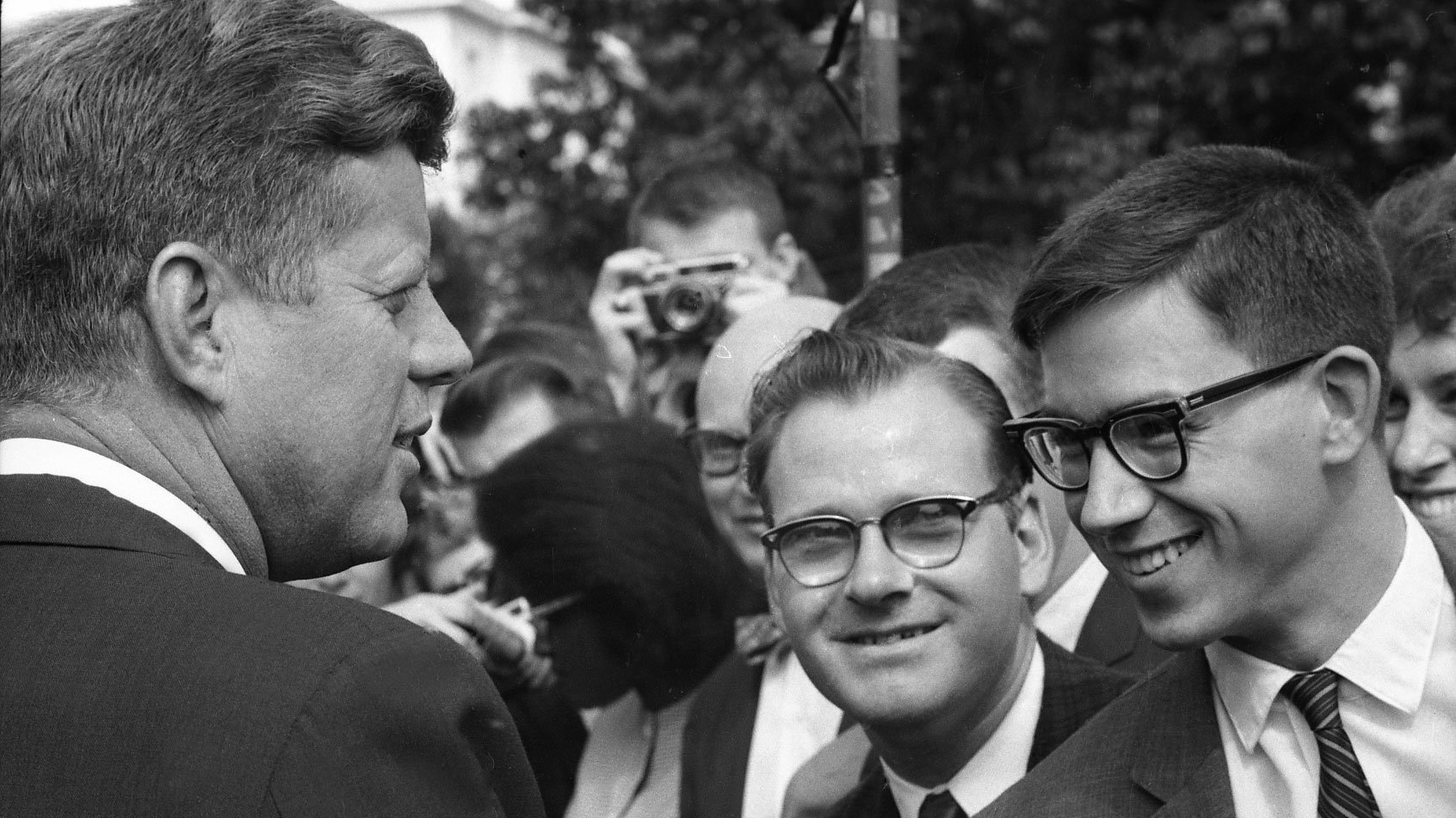GET INVOLVED & RESOURCES
We need your help! The Peace Corps’ archives are scattered far and wide among presidential libraries, universities, the National Archives and Records Administration, museums, institutions, and the attics and basements of many Returned Peace Corps Volunteers and former staff. If you are one of us historically inclined people and have saved film, photos, audio recordings, graphics, and documents of your time with the Peace Corps, would you consider sharing them with us?
We are also in the process of assembling a resource page with links to information sources on the Peace Corps for scholars, journalists, and interested citizens to learn more about and to inspire future study of the agency.
Contact us to let us know what you might be able to share.
Lesson Plans
Lesson plans for middle and high schools with clips from A Towering Task are available on the Educational Resources webpage of NETA (Please, let your teacher friends know!):
https://www.netaonline.org/education/educational-resources/towering-task-educational-resources
Also, lesson plans for the university level and a community discussion guide can be found here:
https://journeysinfilm.org/product/a-towering-task/
Peace Corps itself has developed educational resources in cooperation with Discover:
Federal Websites
Please note: The Peace Corps in-house Library was closed in 1999. Books published before that date may reference Peace Corps Archives. That usually refers to the defunct Library. There are documents that we could not locate and that may be a consequence of the closing of the Library. It could also mean that such documents do not exist. We could not find material provided directly by the Host Country Nationals with whom Volunteers worked. We could not find many documents about the overseas administrative units.
We could not find chronological, comprehensive documentation of all the work done by approximately 225,000 Volunteers, in 141 countries, over 56 years. This list of resources reflects these gaps. We are committed to continue to work towards bridging these gaps. And the many interviews recorded for this documentary will become part of these archives. (In 2011, Peace Corps posted the statement that staff was not available to help with historical research.)
Peace Corps Official Websites
PeaceCorps.gov: (Federal) Documents, reports and general information.
Office of the Inspector General of the Peace Corps: Program and country evaluations as well as accountability reports.
Media Library: Photos and descriptions of Volunteer work.
Office of Freedom of Information Act: The Peace Corps is subject to the Freedom of Information Act, including provisions of the act providing individuals with the right to request records created by the Peace Corps and other federal agencies. Some examples of federal records obtained through the FOIA procedures and available from the FOIA office by number:
FOIA 17-0044: Peace Corps Transition Briefing Book November 2, 2016.
FOIA 17-0148: MOU between Peace Corps and Rotary International establishing partnership.
FOIA 10-060: Information about the closing of the Peace Corps Library.
National Archives & Record Administration
National Archives and Records Administration: The Peace Corps records are located at Archive II in College Park, MD, Record Group 490.
John F. Kennedy Presidential Library: The library has memorabilia from RPCVs who served during the Kennedy years and RPCVs oral histories from all years.
United States Peace Corps Records: Records 1961-1992. Microfilm copies of Director's staff meeting reports, press releases, weekly reports to the President, volunteer information reports, and publications. Hard copy consists of publications, reports, country studies, training manuals etc.
Returned Peace Corps Volunteer Collection: Manuscripts, documents, printed materials, oral history interviews, 1961- . Donations by private individuals documenting personal experiences while serving in the Peace Corps. Includes correspondence, diaries, journals, publications, sketches, memoirs, books, maps, poems, project descriptions, audiovisual materials (including oral history recordings), and songs.
Other Federal Resources
The Smithsonian has a collection of materials from Volunteers and staff. The American History Museum and the National Anthropological Archives are two of the museums. Access the Papers of Peace Corps Volunteers, 1920-1984, or the Online Finding Aid
The Education Research Information Center or ERIC: ERIC also has a wide range of Peace Corps materials. The materials include training manuals, reports of successful projects, and plans to engage schools in learning more about the world among many other topics.
Library of Congress: An annotated bibliography of books authored By RPCVs and Staff.
Universities
Please Note: Many other universities, both public and private, may have Peace Corps documents in their collections. It may be necessary to contact each library directly to learn about such items and the manner to access them.
American University:
(Private university)
The Peace Corps Community Archive curated by the American University Library collects, preserves, and makes available materials that were created and acquired by Peace Corps Volunteers. The archive is used to support student and scholarly research, create exhibits, and provide educational and public programs that document the experiences and impact of individuals who served in the Peace Corps.
Colorado State University:
(Public university)
Colorado State University became involved with the early development of the Peace Corps through the work of Maurice L. Albertson and the successful 1960 proposal on behalf of CSURF (Colorado State University Research Foundation) to the ICA (International Cooperation Agency) to investigate the possibility of establishing a "youth corps" that would become the Peace Corps. Colorado State University soon began training Peace Corps volunteers for work in Pakistan and other parts of the world. Albertson remained interested in the Corps, and in 1986 he organized a seminar focusing on the future of the Peace Corps. The collection contains correspondence, reports, printed materials, photographs and slides from the period during and following the Peace Corps' founding, as well as correspondence, planning documents, publications, notes, and cassette tapes from the 1986 seminar.
George Washington University:
(Private university)
The National Security Archive at George Washington University is an excellent resource for public documents describing the diplomatic, military and other areas of US Foreign Policy. It an independent archive and provides a subscription service to public and private libraries. To access its entire collection online, it is necessary to visit a library that subscribes to the Digital National Security Archive to be able to view all the documents.
DNSA/GWU:Collection: El Salvador, The Making of U.S. Policy 1977-1984, Item Number: ES00332): These documents describe the events leading up to the evacuation of Peace Corps from El Salvador in 1980.
University of Kentucky:
(Public university)
This project includes interviews with returned Peace Corps volunteers and individuals associated with the Peace Corps with connections to Kentucky. Interviewees served in the Peace Corps from its inception in 1961 to the present. Volunteers discuss their experiences before, during, and after Peace Corps including their motivations for joining, the application process, training, living situations, difficulties, the job, relationships, coming home, and their impact on the host country and on their own lives.
University of Michigan:
(Public University)
The Bentley Historical Library at the University of Michigan has a collection of papers from Peace Corps Volunteers.
University of New Mexico:
(Public University)
The University of New Mexico Peace Corps Collection contains the original proposals and correspondence with national Peace Corps for the creation of the first Latin American Training Center in the nation. The collection contains materials on all aspects of the program and is separated into office, training and country records. The office records include proposals, contracts, meeting minutes, correspondence, and financial information. The training records include booklets, pamphlets, articles, correspondence, evaluations, and photographs. The country records include training materials from the Latin American countries UNM sent volunteers to. There are published reports, correspondence, articles, Peace Corps newsletters produced in Latin America, field feedback related to programs, biographical information on volunteers, and photographs. The collection also includes two audio cassette tapes of John F. Kennedy at Michigan Union in 1960 and a copy of the video-recording, Peace Corps at thirty-five; the power of an idea.
University of Oklahoma:
(Public University)
Project Peace Pipe: Indian Youth Pre-Trained For Peace Corps Duty, by Fred R. Harris and Leon H. Ginsberg.
University of Southern California:
(Public University)
The Peace Corps Korea Collection, hosted in the USC digital library, contains audio, video, still photographs, works of art, as well as publications, correspondence, memoirs, and other documents.
University of Texas-El Paso:
(Public University)
A report of one of the first college sites for Peace Corps Training; Tanzania I.
An index of over 500 dissertations and theses for which Peace Corps was the subject.
Online Resources
Please note: These resources are not affiliated with the Peace Corps but were created by Returned Peace Corps Volunteers.
Peace Corps World Wide
Peace Corps Worldwide celebrates the Peace Corps experience by publishing stories from around the world by RPCVs and Peace Corps Volunteers (PCVs), to share with all who have a desire for international understanding.
This effort is at the heart of the Third Goal of the Peace Corps, to “bring the world back home.” Publicizing the writings of RPCVs and PCVs, all their novels, short stories, essays, and poetry is a positive way of educating Americans about the world; an essential Peace Corps Third Goal activity to provided a link between the cultures of the world and our culture.
All work done for Peace Corps Worldwide is volunteer, and the site is in no way associated with the Peace Corps or the National Peace Corps Association. This online magazine is an outgrowth of the print newsletter Peace Corps Writers that was first published in 1989 by John Coyne and Marian Haley Beil (both Ethiopia 1962–64) to promote, encourage and recognize Peace Corps writers. In the duration the effort has expanded to do all that as well as to share news and information about the Peace Corps, assist the members of the Peace Corps community bridge cultures as they fulfill the Third Goal of the Peace Corps, tell the incomparable stories that come from the Peace Corps experience, and more recently, publish their books.
A brief history about this important effort.
Peace Corps Online, The Independent News Forum Serving Returned Peace Corps Volunteers: Hugh Pickens, RPCV, is publisher. There are no current postings, but it is a historical source.
Posh Corps, from producer and director of the film Posh Corps, RPCV Alan Toth, also produces this online resource. Posh Corps is a website which focuses on the modern Peace Corps experience. “Our films and videos tell the stories of volunteers in South Africa, West Africa, Eastern Europe, Asia and the Americas.”
Sargent Shriver Peace Institute includes online speeches by Sargent Shriver delivered during the time he was the first Peace Corps Director. Photos, documents, and the PBS documentary about Sargent Shriver, American Idealist, are also part of the Institute’s collection.
The U.S. Peace Corps has been sending volunteers from the United States to countries all over the world for over 50 years. In fact, Live Lingua was founded by one of these volunteers. During his training he was amazed at how quickly and effectively the language learning material worked. Live Lingua has contacted the Peace Corps offices in Washington D.C. to obtain permission to be a repository of these courses, but we do not own any rights to them. If anybody wants to use this material for commercial purposes they will need to contact the Peace Corps offices to get permission. We are offering this material free of charge with no cost or commercials. If you have information that would lead you to believe that some of this material is not public domain, or if you have some PC training material that we have missed, please contact support@livelingua.com. Enjoy the free language learning.
Please note: Even though Live Lingua was founded by a returned Peace Corps volunteer (Mexico 2006-2008) neither he nor Live Lingua is currently affiliated with the U.S. Peace Corps. Making and maintaining this portion of Live Lingua is his way of helping complete the Peace Corps Third Goal.
Museum of the Peace Corps Experience
Please Note: The museum is an NGO and not affiliated with the Peace Corps; it was created by Returned Peace Corps Volunteers.
The Committee for a Museum of the Peace Corps Experience (CMPCE) is devoted to sharing the Peace Corps story with the broader American public. The museum is not yet a reality, but active support from the national returned volunteer community will get us there.
We were started in 1999 by a committed group of returned Peace Corps Volunteers in Portland, Oregon. While most of our members are drawn from the Portland metro region, involvement is welcome from returned Peace Corps Volunteers, staff, and supporters all over the world.
We are an affiliate group of the National Peace Corps Association, and we coordinate our activities with the Columbia River Peace Corps Association.
Please contact the Museum about their policy for accepting items from RPCVs.
The RPCV Oral History Project began in 1999 and RPCVs have been interviewed since then. The Project was founded by Robert Klein, Ghana I, following the 35th anniversary of Peace Corps. Together with volunteers whom he trained to interview other RPCVs, Bob interviewed and oversaw the recordings of over 450 RPCVs’ experiences between 1999 and April 2012 when he died. His friend Phyllis Noble picked up the coordinator’s role in 2012 and continued Bob’s work, adding another 180 interviews to the collection until her death in May 2017.
The Project is now assembling a team of dedicated RPCVs to produce more recordings, expand the number of interviewers, design a website and social media presence and take the Project to a new phase, all the time adhering to the quality of interviews and technology standards needed to preserve the recorded Peace Corps experiences in perpetuity.
All oral history interviews are with RPCVs or Peace Corps staff who talk about their lives before, during and to some extent after Peace Corps service. We are preserving the history and legacy of PCVs and the work they do in international development. Our recordings document data for all three Peace Corps goals, but most importantly they support the Third Goal. Since the inception of the Project in 1999, over 620 interview have been captured and are part of the National Archives housed in the John F Kennedy Library.
Vision: Preserve the legacy of Peace Corps as experienced and articulated by individual Peace Corps Volunteers.
Mission: To find and interview all returned Peace Corps Volunteers about their intercultural service experiences and deposit the recordings in the National Archives at the John F. Kennedy Library.
Historical Reference Works & Scholarly Papers
This list is divided into two parts. The first includes works by authors who were Peace Corps Volunteers and/or Peace Corps Staff. The second includes work by Scholars and Journalists who were not Peace Corps Volunteers and/or Peace Corps Staff.
The list is not meant to be exhaustive. As already noted, the Library of Congress has an annotated bibliography of over 300 books authored by RPCVs and Staff.
Peace Corps World Wide has a bibliography of Peace Corps Writers that is constantly updated.
Works By Authors Who Were Peace Corps Volunteers And/Or Peace Corps Staff:
Peace Corps Chronology – 1961-2010, by Lawrence F. Lihosit, RPCV, 2011
Point of the Lance by Sargent Shriver, 1964
When the World Calls – The Inside Story of the Peace Corps and its First Fifty Years,by Stanley Meiser (former Peace Corps Staff), 2011
The Peace Corps Experience: Challenge and Change 1969-1976, by P. David Searles (Former Peace Corps Country Director and staff), 1997
Keeping Kennedy’s Promise - Unmet Hope of the New Frontier, by Kevin Lowther and C. Payne Lucas (Former Peace Corps Staff),1978
A Moment in History: The First 10 Years of the Peace Corps, by Brent Asgabranner (Former Peace Corps staff),1971
Agents of Change: A Close Look at the Peace Corps,by David Hapgood and Meridan Bennett (Former Peace Corps Staff),1968
Cultural Frontiers of the Peace Corps,edited by Robert T. Textor (former Peace Corps staff),1966
Come As You Are: The Peace Corps Story,by Coates Redmon,1986
The Politics of the Peace Corps & VISTA, by T. Zane Reeves,1988
Of Kennedys and Kings: Making Sense of the Sixties, by Harris Wofford, 1980
Cultural Humility and the Peace Corps, by Alan E. Guskin,1991
The Peace Corps' "In-Up-Out" Policy: Reflections on How it All Happened by Robert B. Textor, 2011
Works By Journalists And Scholars Who Were Not Peace Corps Volunteers And/Or Peace Corps Staff:
The Bold Experiment, JFK’s Peace Corps,by Gerard T. Rice, 1985
All you need is Love: The Peace Corps and the Spirit of the 1960s, by Elizabeth Cobbs Hoffman, 1998
Making A Difference: The Peace Corps at Twenty-Five by Milton Viorst, 1986
Letters from the Peace Corps edited by Ireis Luce, 1964
Volunteers for Peace: The First Group of Peace Corps Volunteers in Colombia by Morris Stein, 1966.
What You Can Do For Your Country: An Oral History of the Peace Corps, by Karen Schwarz,1991
Making Them Like Us: Peace Corps Volunteers in the 1960's, 1998
Other Suggestions
The National Peace Corps Association: A roster of RPCV alumni groups. Many groups preserve history of their host countries. Many RPCV alumni groups also are working on projects, now, to benefit their host countries, and their websites would carry information about such efforts.
A Towering Task Is Completely Accessible!
In the true Peace Corps spirit and thanks to the generous support of Ken and Lucy Lehman and Michele Spitz of Woman of Her Word, the documentary is fully accessible with subtitles for the deaf and hard-of-hearing, as well as audio description for the visually impaired. Ken and Lucy made possible the subtitles and captions in memory of Marca Bristo, relentless disability activist who changed the world. Professional voiceover artist, public speaker, advocate and philanthropist, Michele Spitz is dedicated to making the world accessible to all communities. Michele is most passionate about her audio description production and voiceover narration allowing access for visually impaired audiences to equally experience film and digital media, and the arts.

